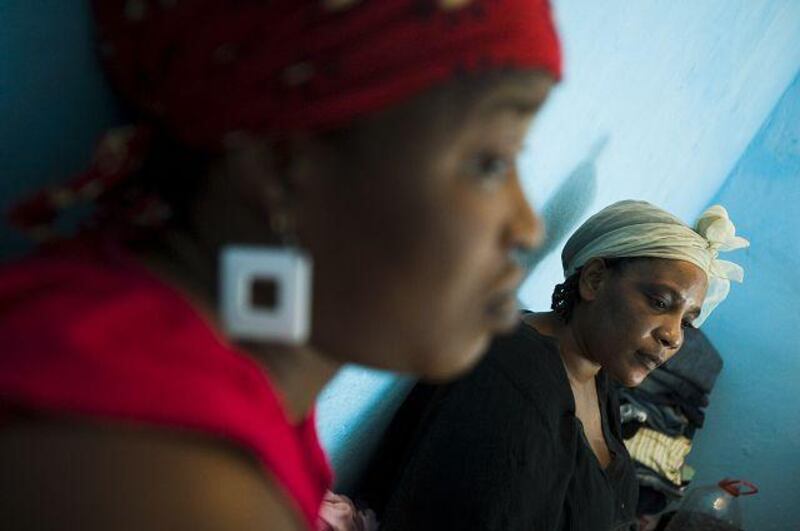DAKAR, SENEGAL // More than 4,800km from the hills and valleys of Sierra Leone, the former Liberian president Charles Taylor is on the witness stand for the second week of his defence case in The Hague. He is charged with 11 counts of war crimes allegedly committed during Sierra Leone's civil war of 1991-2004, including murder, rape and the recruitment of child soldiers.
Mr Taylor is the first African head of state to be tried in a UN-backed court. It is, arguably, a historic moment for global justice. The 61-year-old's aviator-style sunglasses have made the front pages of newspapers from New York to Sydney. His denial of responsibility for crimes against humanity has provoked shock on a global level. As Mr Taylor's testimony continues this week, the world is watching.
But despite outreach efforts by the Special Court for Sierra Leone, many Sierra Leoneans and Liberians are not. "I've been reading about the trial on the web," said Komba Naneh, a student in Freetown, the Liberian capital, who said the trial was for the West, not West Africa. "If it was happening in Sierra Leone, everybody would be talking about it, but the moment Charles Taylor left West Africa, he also left the minds of lots of people."
The Special Court for Sierra Leone moved the trial to The Hague last year amid fears of stoking instability in West Africa. The trade-off, it seems, is apathy. Though the courtroom action is streamed live online, internet speed is so slow in Sierra Leone that most people are unable to follow it. A handful of the country's under-resourced newspapers are reporting the trial, but it is the rainy season, and circulation is limited to Freetown and major towns. There are only occasional updates on national radio stations.
"The Special Court for Sierra Leone in Freetown, where the proceedings from The Hague are being shown by video link, [has been] empty," said Tania Bernath, a researcher for Amnesty International in Sierra Leone. "People seem unaware of what is happening." The war in Sierra Leone brought the country to its knees. At least 500,000 were killed and millions displaced. Mr Taylor is accused of micromanaging the conflict from neighbouring Liberia, backing the Revolutionary United Front rebels to pursue diamond wealth.
RUF soldiers, many of whom were teenagers, became renowned for hacking off the limbs of civilians with machetes, ripping foetuses from the bellies of pregnant women and sometimes eating the organs of those they killed. But Mr Taylor denies responsibility, instead painting himself as a humanitarian and a peacemaker. As part of his testimony, he said there was no recruitment of child soldiers and that children were used only to carry weapons. He says he played no part in forming the guerrilla force that invaded Sierra Leone in the early 1990s.
Mr Naneh, who was in his teens when the war ended, said he was outraged by the suggestion that children were not used as gunmen. As Sierra Leone moves from a post-conflict phase to development, one of its biggest problems has been that of reintegrating former child soldiers into society. Most have little income or education. With that comes lack of access to the internet. For the most part, they too are looking the other way.
"The overwhelming majority of Sierra Leoneans are not paying attention to [the trial] and it's having very little impact on their lives," said Shelby Grossman, a US-based researcher of West African politics. But some Liberians do want to see Mr Taylor brought to justice. The tribunal overlaps with the justice process spearheaded by Liberia's Truth and Reconciliation Commission. For the past three years the TRC, modelled on South Africa's post-apartheid truth commission, has been listening to testimonies from victims and perpetrators of the 14-year Liberian war.
The TRC's final report, released this month, recommended that Liberia's former warlords, including Mr Taylor and the rebel leader Prince Johnson, be tried for war crimes. But Mr Taylor cannot be held accountable for crimes in Liberia while he is on trial for crimes in Sierra Leone. "With Prince Johnson going back to the TRC to confess and tell the Liberian people what he did and that he's sorry for that, that's important. Well it can't be the same with Charles Taylor because he is already on trial somewhere else," said Papie Stow, who lived in Liberia and Sierra Leone during the wars in both countries.
Nina Jalloh fled her hometown of Paynesville, Liberia, in the midst of that country's war. Her parents were killed in an explosion during fighting between Mr Taylor's rebels and the West African peacekeeping force ECOMOG, which became a faction in the war. Ms Jalloh and her sister sought shelter in Cote d'Ivoire, then Sierra Leone, but when she found herself caught in the crossfire of other countries' wars, they travelled to safety in Senegal.
She said she was not interested in the trial of Mr Taylor. "I know it is happening but I'm not really following it. In war, there are no rules, anything can happen. We don't pin the blame on anybody.The trial of Charles Taylor is important to some Liberians, but we cannot say we put the blame on Charles Taylor alone because every Liberian was involved in the war," Ms Jalloh said. "Now we want to forget about the war, just like everyone else around the world, just like soldiers in Afghanistan and the Americans who fought in Vietnan."
Ms Grossman said that for the majority of people, the big fish was not Mr Taylor. "Taylor did not rape their sister, Taylor did not loot their village," she said. "Maybe people under his command did, but his responsibility for these local crimes isn't as clear." kthomas@thenational.ae





